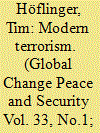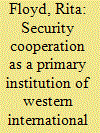|
|
|
Sort Order |
|
|
|
Items / Page
|
|
|
|
|
|
|
| Srl | Item |
| 1 |
ID:
177547


|
|
|
|
|
| Summary/Abstract |
This paper aims to analyse the growing enlargement of the spheres of competition from the Middle East into the Horn of Africa. It does so by using insights from regional order and realist neoclassical literature to understand the expansion of regional powers into this area as the result of strategic interactions within their own region. The central argument is that the clashing interests among Middle Eastern regional powers and power asymmetry with Horn of Africa countries are driving an increased security interdependence between the two Red Sea shores. This increasing security engagement by competing Middle Eastern states is producing an insecurity spillover which threatens to exacerbate regional instability in the Horn. It also presents a new role for Middle Eastern regional powers as security providers, particularly in the case of the United Arab Emirates, Saudi Arabia, Israel and Turkey. To substantiate this argument, the paper analyses interregional security dynamics by focusing on three empirical cases in the 2015–2020 period: The Gulf Cooperation Council’s crisis, the establishment of a Turkish military bases in the Horn of Africa and Israel’s new diplomatic engagement in Eastern Africa.
|
|
|
|
|
|
|
|
|
|
|
|
|
|
|
|
| 2 |
ID:
177550


|
|
|
|
|
| Summary/Abstract |
The recent military standoff between India and China in Ladakh had received tremendous public attention, both domestic and international. Mounting uncertainty, chaos, and looming instability marked the crisis for the fact that it shattered the prolonged stability along the Line of Actual Control (LAC). Particularly for India, it marked the heightening national security challenges from China. While the discussions that followed the crisis explored at length how the clash and the ensued crisis generated security threats, it seems to have inadequately captured the nuances of the insecurity generated. The article argues that the security concerns generated were not just physical but also ‘ontological’. The paper seeks to demonstrate how the Ladakh crisis engendered a sense of ontological insecurity for India.
|
|
|
|
|
|
|
|
|
|
|
|
|
|
|
|
| 3 |
ID:
177549


|
|
|
|
|
| Summary/Abstract |
In most cases, terrorism must be considered as an outcome of both individual motives and strategic considerations on an organisational or group level. Whether the (strategic) intentions of a group or individual motives constitute the main driver varies with the different sources of motivation behind terrorism. The robustness and consistency of proclaimed political agendas of terror groups differ significantly and, therefore, also their ‘strategic’ use of terrorism. Overall, one can argue that today groups represent the main drivers behind global terrorism as they account for the vast majority of attacks and casualties. However, one can also identify a growing blurring of boundaries between the actions of terror organisations and independently acting terrorists facilitated through modern communication technology.
|
|
|
|
|
|
|
|
|
|
|
|
|
|
|
|
| 4 |
ID:
177545


|
|
|
|
|
| Summary/Abstract |
In this article, I focus on a subset of Obama’s foreign policy views, namely his beliefs about the appropriate circumstances under which the United States should engage in armed conflict. I argue that the Iraq war served as a formative event in the development of Obama’s worldview. He derived distinct lessons from this policy failure, leading him to articulate a restrictive set of conditions that should be met before the United States considered intervening in the internal politics of another nation, absent a direct threat to national security. I undertake a detailed examination of two case studies – the administration’s debates leading to the 2011 intervention in Libya and the decision not to intervene in Syria in 2013 – and demonstrate how the lessons of Iraq shaped Obama’s policy choices at critical junctures in the deliberations.
|
|
|
|
|
|
|
|
|
|
|
|
|
|
|
|
| 5 |
ID:
177546


|
|
|
|
|
| Summary/Abstract |
How do western states respond to real or perceived security threats? Do they tend to respond to the same threat in haphazard ways, or does their response follow similar patterns? By analysing the response to a number of diverse contemporary threats – the Crimean crisis, North Korea's nuclear proliferation, climate change and the 2014–2016 Ebola epidemic – this article shows that the security responses by different western states to the same threat tend to be consistent across states, while they also tend to follow a seemingly self-evident pattern of behaviour. In light of these findings, the article suggests that the joint pursuit of security (for short: security cooperation) has replaced war as a primary institution at the western core of sub-global international society. In order to make this argument this article develops a new approach to analysing primary institutions: the practice-based method. While this method is inspired by Peter Wilson and Kilian Spandler's idea that practitioners’ behaviour and rhetoric matters to institutional status, it draws analytical purchase also from Emanuel Adler and Vincent Pouliot's influential practice-based theory to International Relations.
|
|
|
|
|
|
|
|
|
|
|
|
|
|
|
|
| 6 |
ID:
177548


|
|
|
|
|
| Summary/Abstract |
South Sudan became a juridical state in July 2011. Its statehood materialised after protracted north-south civil wars were brought to an end by the 2005 Comprehensive Peace Agreement (CPA). The CPA set forth self-rule for an interim period and a referendum on independence for the South Sudanese in January 2011. While the two states split peacefully, post-separation relations between the Sudans has been complicated. This paper explores the unamicable political divorce of South Sudan from Sudan. It examines the key post-separation issues that have remained sources of contention and conflict between the Sudans. Based on a qualitative approach, and primary and secondary sources of data, the paper argues that border claims over Abyei and Heglig/Panthou, the politics of oil, mutual subversion, historical grievances, and internal political dynamics continue to drag the two countries into conflict. It argues that because of their importance to the socio-economic and political vitality to both states, border claims and oil remain particularly important in shaping relations between the Sudans. Unless managed properly, based on a win-win approach, the divergence on outstanding issues will exacerbate state building challenges in the world’s newest state of South Sudan.
|
|
|
|
|
|
|
|
|
|
|
|
|
|
|
|
|
|
|
|
|